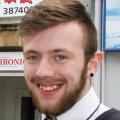
THE Wales squad for the upcoming Homeless World Cup tournament has been announced and a man from Colwyn Bay has been included alongside many others from across North Wales.
The 17th edition of the Homeless World Cup will take place in Cardiff’s iconic Bute Park, right at the heart of the Welsh capital, from July 27 – August 3.
Tom Brady from Colwyn Bay has experienced homelessness, having lived in a hostel. The 24-year-old is currently sofa surfing while he waits for permanent stable accommodation.
He is in recovery from substance abuse and says his ambition in life is to be the best dad he can be to his daughter.
Speaking to the Homeless World Cup website, he said: "I’m absolutely buzzing to get started and I feel so proud of myself to have been chosen for the squad.”
The Homeless World Cup teams are selected through Street Football Wales, who have been behind programmes to aid social inclusion through sport since the inaugural tournament back in 2003.
A Wales women's team will also be taking part at the event and includes young women who have experienced social exclusion in the past 12 months through homelessness, substance misuse, mental health problems or cultural issues.
Both the Men and Women's were given the opportunity to be spectators at Leckwith Stadium recently while the Wales senior women’s team were taking part in a training session ahead of their match against New Zealand on June 4.
Following the training session, there was a meet and greet in which members met footballing stars Loren Dykes, Natasha Harding, Sophie Ingle and Rhiannon Roberts.
Keri Harris, Director & Founder of Street Football Wales, and Squad Manager for both Welsh teams at the Homeless World Cup in Cardiff, said: “The FAW has always been incredibly supportive of what we do at Street Football Wales and the players are always prepared to go out of their way to show support to our team.
“Street Football Wales has had a huge impact on players over the past 16 years and we estimate to have worked with over 8000 players in that time with our biggest impacts being on physical and mental health, confidence and self-esteem, a reduction in substance misuse and people feeling less isolated.”



Comments: Our rules
We want our comments to be a lively and valuable part of our community - a place where readers can debate and engage with the most important local issues. The ability to comment on our stories is a privilege, not a right, however, and that privilege may be withdrawn if it is abused or misused.
Please report any comments that break our rules.
Read the rules here